Career Counseling Case Study: Holland & Super's Theories on John
VerifiedAdded on 2023/06/10
|11
|3366
|148
Case Study
AI Summary
This case study delves into the application of career counseling principles to address the professional and personal challenges faced by John, a 44-year-old teacher. It explores the relevance of Holland's theory, which emphasizes the congruence between personality types and work environments, and Super's theory, which considers the various life roles individuals undertake. The study assesses John's situation, marked by workplace dissatisfaction and domestic issues, through these theoretical lenses, suggesting interventions such as reassessing his work role importance and addressing family conflicts. Assessment tools like the MBTI and DISC are considered, with an emphasis on ethical and professional responsibilities in counseling, including privacy, honesty, and informed consent, all guided by the ACA Code of Ethics. Ultimately, the case study seeks to provide a framework for understanding and addressing career-related issues through comprehensive counseling strategies.
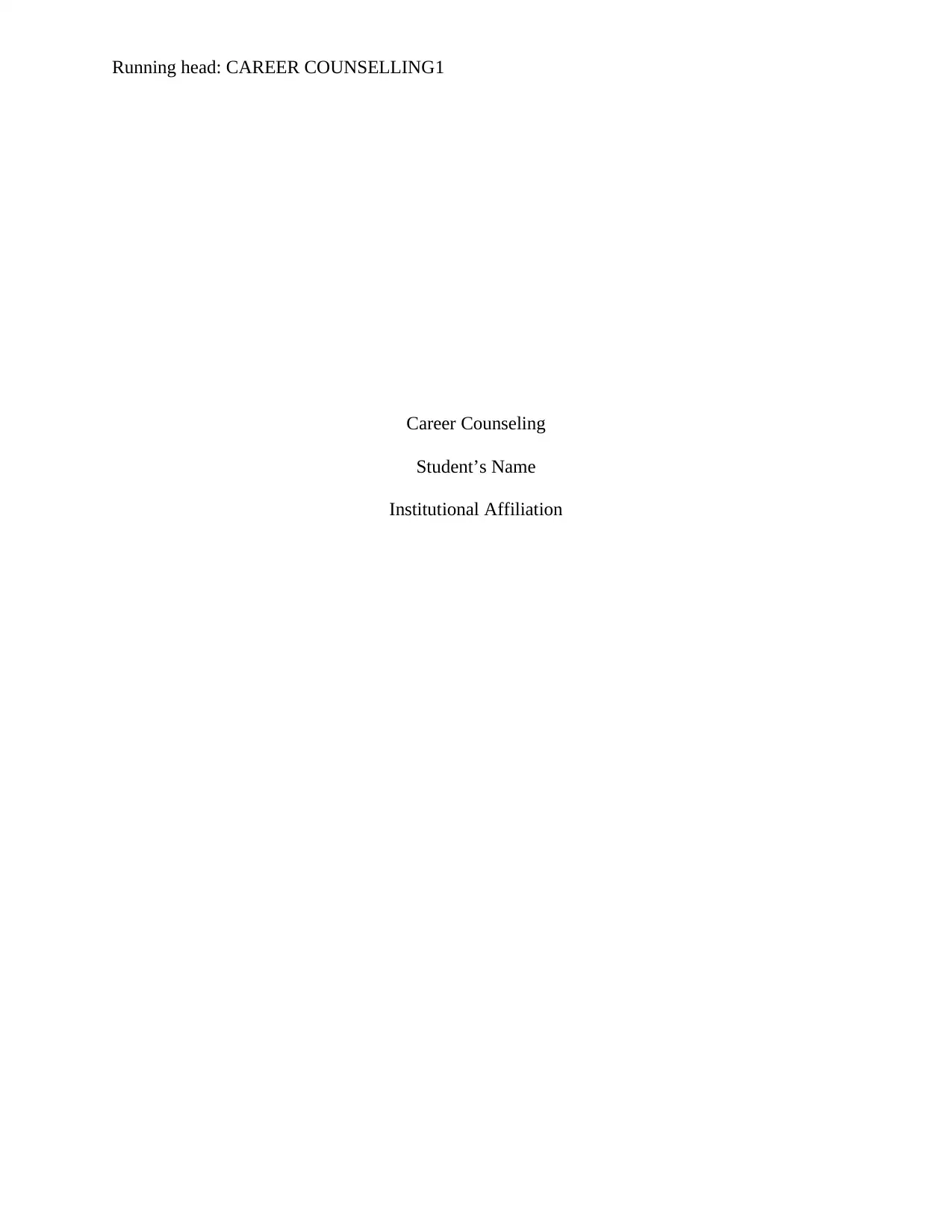
Running head: CAREER COUNSELLING1
Career Counseling
Student’s Name
Institutional Affiliation
Career Counseling
Student’s Name
Institutional Affiliation
Paraphrase This Document
Need a fresh take? Get an instant paraphrase of this document with our AI Paraphraser
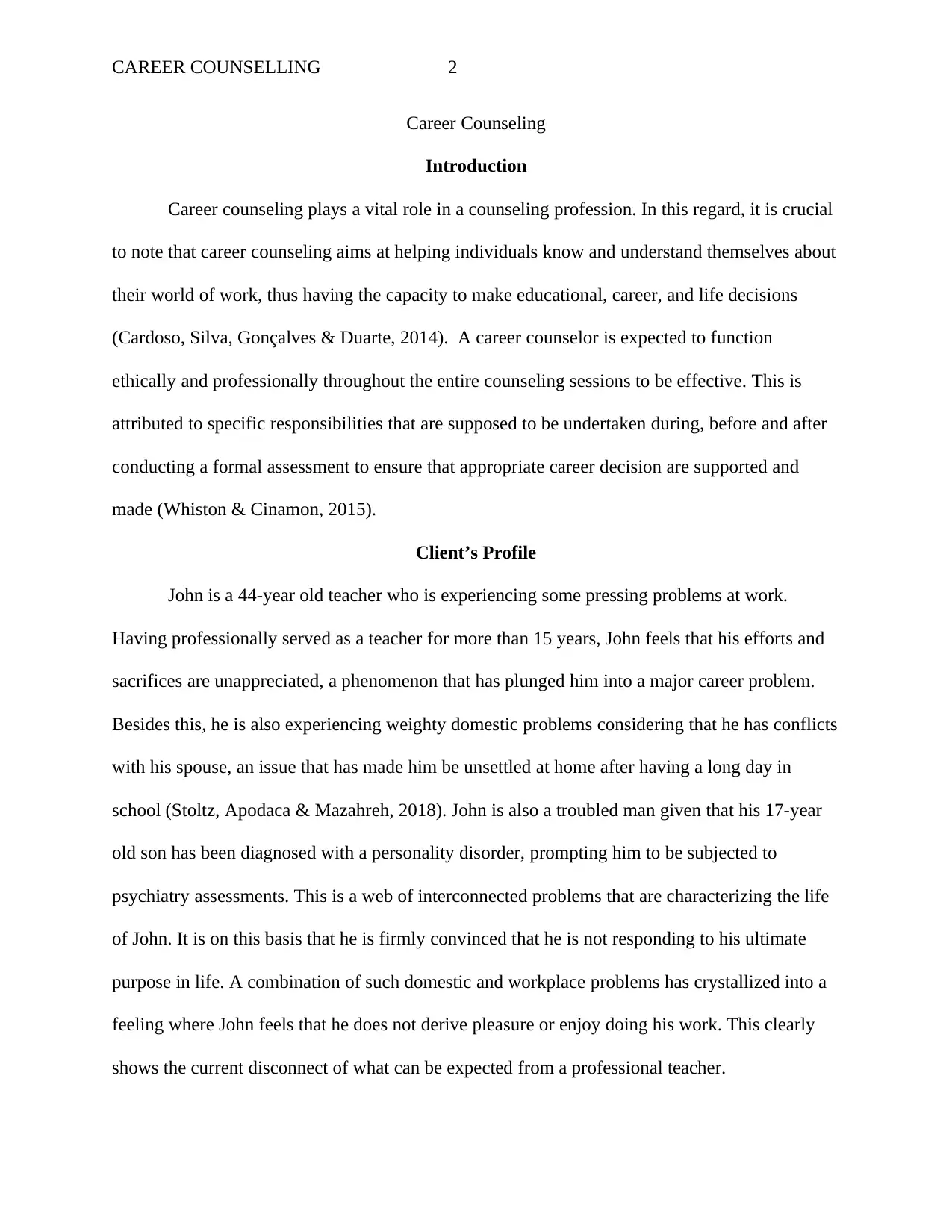
CAREER COUNSELLING 2
Career Counseling
Introduction
Career counseling plays a vital role in a counseling profession. In this regard, it is crucial
to note that career counseling aims at helping individuals know and understand themselves about
their world of work, thus having the capacity to make educational, career, and life decisions
(Cardoso, Silva, Gonçalves & Duarte, 2014). A career counselor is expected to function
ethically and professionally throughout the entire counseling sessions to be effective. This is
attributed to specific responsibilities that are supposed to be undertaken during, before and after
conducting a formal assessment to ensure that appropriate career decision are supported and
made (Whiston & Cinamon, 2015).
Client’s Profile
John is a 44-year old teacher who is experiencing some pressing problems at work.
Having professionally served as a teacher for more than 15 years, John feels that his efforts and
sacrifices are unappreciated, a phenomenon that has plunged him into a major career problem.
Besides this, he is also experiencing weighty domestic problems considering that he has conflicts
with his spouse, an issue that has made him be unsettled at home after having a long day in
school (Stoltz, Apodaca & Mazahreh, 2018). John is also a troubled man given that his 17-year
old son has been diagnosed with a personality disorder, prompting him to be subjected to
psychiatry assessments. This is a web of interconnected problems that are characterizing the life
of John. It is on this basis that he is firmly convinced that he is not responding to his ultimate
purpose in life. A combination of such domestic and workplace problems has crystallized into a
feeling where John feels that he does not derive pleasure or enjoy doing his work. This clearly
shows the current disconnect of what can be expected from a professional teacher.
Career Counseling
Introduction
Career counseling plays a vital role in a counseling profession. In this regard, it is crucial
to note that career counseling aims at helping individuals know and understand themselves about
their world of work, thus having the capacity to make educational, career, and life decisions
(Cardoso, Silva, Gonçalves & Duarte, 2014). A career counselor is expected to function
ethically and professionally throughout the entire counseling sessions to be effective. This is
attributed to specific responsibilities that are supposed to be undertaken during, before and after
conducting a formal assessment to ensure that appropriate career decision are supported and
made (Whiston & Cinamon, 2015).
Client’s Profile
John is a 44-year old teacher who is experiencing some pressing problems at work.
Having professionally served as a teacher for more than 15 years, John feels that his efforts and
sacrifices are unappreciated, a phenomenon that has plunged him into a major career problem.
Besides this, he is also experiencing weighty domestic problems considering that he has conflicts
with his spouse, an issue that has made him be unsettled at home after having a long day in
school (Stoltz, Apodaca & Mazahreh, 2018). John is also a troubled man given that his 17-year
old son has been diagnosed with a personality disorder, prompting him to be subjected to
psychiatry assessments. This is a web of interconnected problems that are characterizing the life
of John. It is on this basis that he is firmly convinced that he is not responding to his ultimate
purpose in life. A combination of such domestic and workplace problems has crystallized into a
feeling where John feels that he does not derive pleasure or enjoy doing his work. This clearly
shows the current disconnect of what can be expected from a professional teacher.
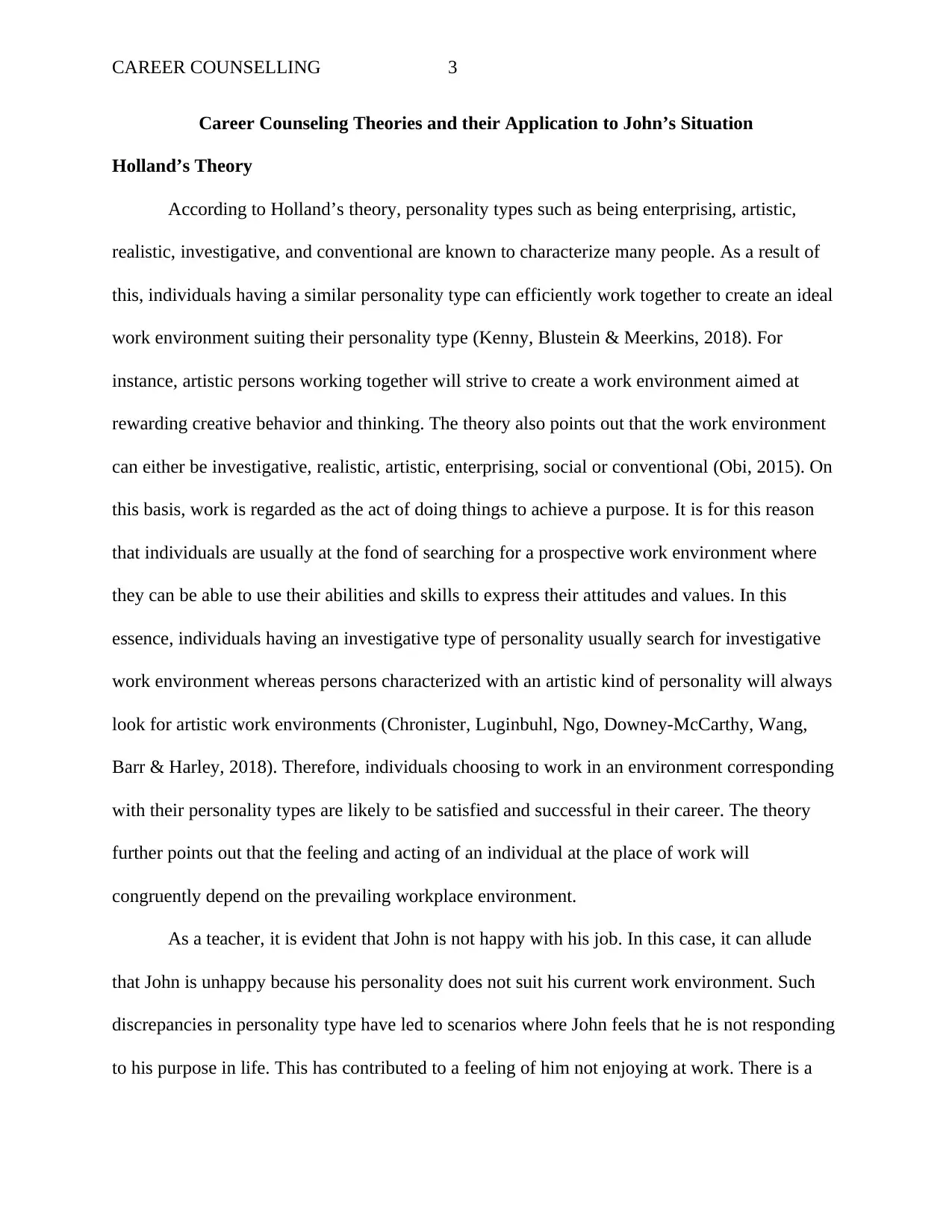
CAREER COUNSELLING 3
Career Counseling Theories and their Application to John’s Situation
Holland’s Theory
According to Holland’s theory, personality types such as being enterprising, artistic,
realistic, investigative, and conventional are known to characterize many people. As a result of
this, individuals having a similar personality type can efficiently work together to create an ideal
work environment suiting their personality type (Kenny, Blustein & Meerkins, 2018). For
instance, artistic persons working together will strive to create a work environment aimed at
rewarding creative behavior and thinking. The theory also points out that the work environment
can either be investigative, realistic, artistic, enterprising, social or conventional (Obi, 2015). On
this basis, work is regarded as the act of doing things to achieve a purpose. It is for this reason
that individuals are usually at the fond of searching for a prospective work environment where
they can be able to use their abilities and skills to express their attitudes and values. In this
essence, individuals having an investigative type of personality usually search for investigative
work environment whereas persons characterized with an artistic kind of personality will always
look for artistic work environments (Chronister, Luginbuhl, Ngo, Downey‐McCarthy, Wang,
Barr & Harley, 2018). Therefore, individuals choosing to work in an environment corresponding
with their personality types are likely to be satisfied and successful in their career. The theory
further points out that the feeling and acting of an individual at the place of work will
congruently depend on the prevailing workplace environment.
As a teacher, it is evident that John is not happy with his job. In this case, it can allude
that John is unhappy because his personality does not suit his current work environment. Such
discrepancies in personality type have led to scenarios where John feels that he is not responding
to his purpose in life. This has contributed to a feeling of him not enjoying at work. There is a
Career Counseling Theories and their Application to John’s Situation
Holland’s Theory
According to Holland’s theory, personality types such as being enterprising, artistic,
realistic, investigative, and conventional are known to characterize many people. As a result of
this, individuals having a similar personality type can efficiently work together to create an ideal
work environment suiting their personality type (Kenny, Blustein & Meerkins, 2018). For
instance, artistic persons working together will strive to create a work environment aimed at
rewarding creative behavior and thinking. The theory also points out that the work environment
can either be investigative, realistic, artistic, enterprising, social or conventional (Obi, 2015). On
this basis, work is regarded as the act of doing things to achieve a purpose. It is for this reason
that individuals are usually at the fond of searching for a prospective work environment where
they can be able to use their abilities and skills to express their attitudes and values. In this
essence, individuals having an investigative type of personality usually search for investigative
work environment whereas persons characterized with an artistic kind of personality will always
look for artistic work environments (Chronister, Luginbuhl, Ngo, Downey‐McCarthy, Wang,
Barr & Harley, 2018). Therefore, individuals choosing to work in an environment corresponding
with their personality types are likely to be satisfied and successful in their career. The theory
further points out that the feeling and acting of an individual at the place of work will
congruently depend on the prevailing workplace environment.
As a teacher, it is evident that John is not happy with his job. In this case, it can allude
that John is unhappy because his personality does not suit his current work environment. Such
discrepancies in personality type have led to scenarios where John feels that he is not responding
to his purpose in life. This has contributed to a feeling of him not enjoying at work. There is a
⊘ This is a preview!⊘
Do you want full access?
Subscribe today to unlock all pages.

Trusted by 1+ million students worldwide
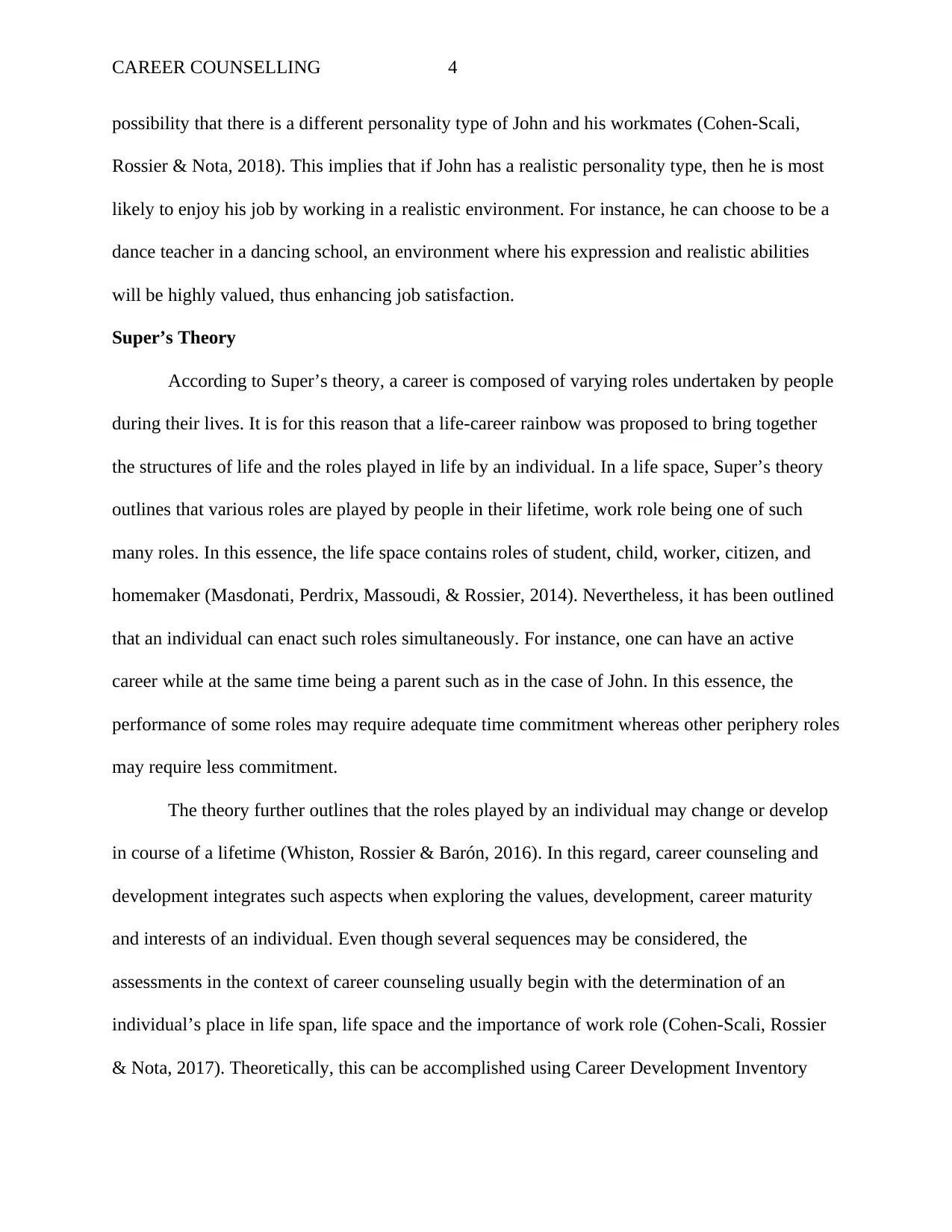
CAREER COUNSELLING 4
possibility that there is a different personality type of John and his workmates (Cohen-Scali,
Rossier & Nota, 2018). This implies that if John has a realistic personality type, then he is most
likely to enjoy his job by working in a realistic environment. For instance, he can choose to be a
dance teacher in a dancing school, an environment where his expression and realistic abilities
will be highly valued, thus enhancing job satisfaction.
Super’s Theory
According to Super’s theory, a career is composed of varying roles undertaken by people
during their lives. It is for this reason that a life-career rainbow was proposed to bring together
the structures of life and the roles played in life by an individual. In a life space, Super’s theory
outlines that various roles are played by people in their lifetime, work role being one of such
many roles. In this essence, the life space contains roles of student, child, worker, citizen, and
homemaker (Masdonati, Perdrix, Massoudi, & Rossier, 2014). Nevertheless, it has been outlined
that an individual can enact such roles simultaneously. For instance, one can have an active
career while at the same time being a parent such as in the case of John. In this essence, the
performance of some roles may require adequate time commitment whereas other periphery roles
may require less commitment.
The theory further outlines that the roles played by an individual may change or develop
in course of a lifetime (Whiston, Rossier & Barón, 2016). In this regard, career counseling and
development integrates such aspects when exploring the values, development, career maturity
and interests of an individual. Even though several sequences may be considered, the
assessments in the context of career counseling usually begin with the determination of an
individual’s place in life span, life space and the importance of work role (Cohen-Scali, Rossier
& Nota, 2017). Theoretically, this can be accomplished using Career Development Inventory
possibility that there is a different personality type of John and his workmates (Cohen-Scali,
Rossier & Nota, 2018). This implies that if John has a realistic personality type, then he is most
likely to enjoy his job by working in a realistic environment. For instance, he can choose to be a
dance teacher in a dancing school, an environment where his expression and realistic abilities
will be highly valued, thus enhancing job satisfaction.
Super’s Theory
According to Super’s theory, a career is composed of varying roles undertaken by people
during their lives. It is for this reason that a life-career rainbow was proposed to bring together
the structures of life and the roles played in life by an individual. In a life space, Super’s theory
outlines that various roles are played by people in their lifetime, work role being one of such
many roles. In this essence, the life space contains roles of student, child, worker, citizen, and
homemaker (Masdonati, Perdrix, Massoudi, & Rossier, 2014). Nevertheless, it has been outlined
that an individual can enact such roles simultaneously. For instance, one can have an active
career while at the same time being a parent such as in the case of John. In this essence, the
performance of some roles may require adequate time commitment whereas other periphery roles
may require less commitment.
The theory further outlines that the roles played by an individual may change or develop
in course of a lifetime (Whiston, Rossier & Barón, 2016). In this regard, career counseling and
development integrates such aspects when exploring the values, development, career maturity
and interests of an individual. Even though several sequences may be considered, the
assessments in the context of career counseling usually begin with the determination of an
individual’s place in life span, life space and the importance of work role (Cohen-Scali, Rossier
& Nota, 2017). Theoretically, this can be accomplished using Career Development Inventory
Paraphrase This Document
Need a fresh take? Get an instant paraphrase of this document with our AI Paraphraser
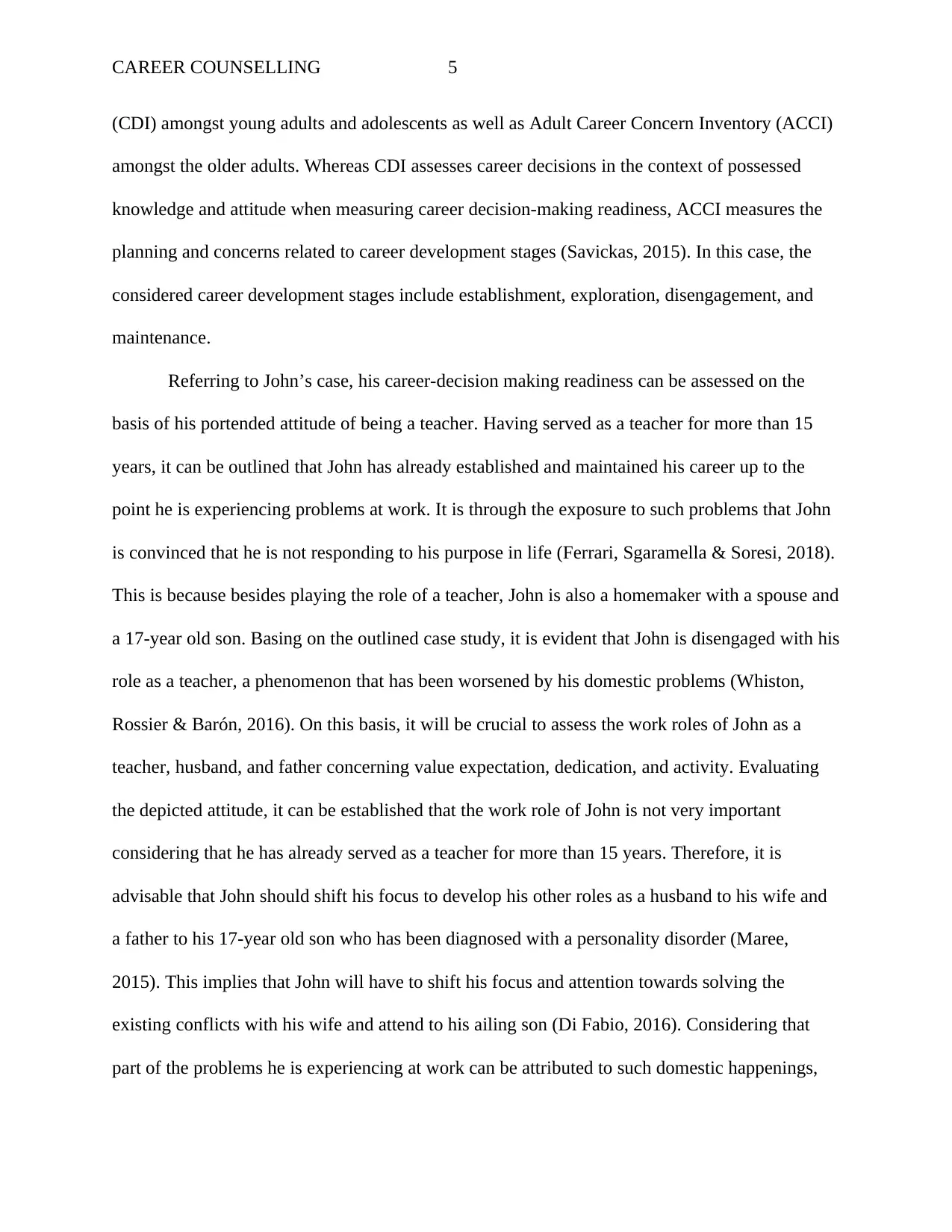
CAREER COUNSELLING 5
(CDI) amongst young adults and adolescents as well as Adult Career Concern Inventory (ACCI)
amongst the older adults. Whereas CDI assesses career decisions in the context of possessed
knowledge and attitude when measuring career decision-making readiness, ACCI measures the
planning and concerns related to career development stages (Savickas, 2015). In this case, the
considered career development stages include establishment, exploration, disengagement, and
maintenance.
Referring to John’s case, his career-decision making readiness can be assessed on the
basis of his portended attitude of being a teacher. Having served as a teacher for more than 15
years, it can be outlined that John has already established and maintained his career up to the
point he is experiencing problems at work. It is through the exposure to such problems that John
is convinced that he is not responding to his purpose in life (Ferrari, Sgaramella & Soresi, 2018).
This is because besides playing the role of a teacher, John is also a homemaker with a spouse and
a 17-year old son. Basing on the outlined case study, it is evident that John is disengaged with his
role as a teacher, a phenomenon that has been worsened by his domestic problems (Whiston,
Rossier & Barón, 2016). On this basis, it will be crucial to assess the work roles of John as a
teacher, husband, and father concerning value expectation, dedication, and activity. Evaluating
the depicted attitude, it can be established that the work role of John is not very important
considering that he has already served as a teacher for more than 15 years. Therefore, it is
advisable that John should shift his focus to develop his other roles as a husband to his wife and
a father to his 17-year old son who has been diagnosed with a personality disorder (Maree,
2015). This implies that John will have to shift his focus and attention towards solving the
existing conflicts with his wife and attend to his ailing son (Di Fabio, 2016). Considering that
part of the problems he is experiencing at work can be attributed to such domestic happenings,
(CDI) amongst young adults and adolescents as well as Adult Career Concern Inventory (ACCI)
amongst the older adults. Whereas CDI assesses career decisions in the context of possessed
knowledge and attitude when measuring career decision-making readiness, ACCI measures the
planning and concerns related to career development stages (Savickas, 2015). In this case, the
considered career development stages include establishment, exploration, disengagement, and
maintenance.
Referring to John’s case, his career-decision making readiness can be assessed on the
basis of his portended attitude of being a teacher. Having served as a teacher for more than 15
years, it can be outlined that John has already established and maintained his career up to the
point he is experiencing problems at work. It is through the exposure to such problems that John
is convinced that he is not responding to his purpose in life (Ferrari, Sgaramella & Soresi, 2018).
This is because besides playing the role of a teacher, John is also a homemaker with a spouse and
a 17-year old son. Basing on the outlined case study, it is evident that John is disengaged with his
role as a teacher, a phenomenon that has been worsened by his domestic problems (Whiston,
Rossier & Barón, 2016). On this basis, it will be crucial to assess the work roles of John as a
teacher, husband, and father concerning value expectation, dedication, and activity. Evaluating
the depicted attitude, it can be established that the work role of John is not very important
considering that he has already served as a teacher for more than 15 years. Therefore, it is
advisable that John should shift his focus to develop his other roles as a husband to his wife and
a father to his 17-year old son who has been diagnosed with a personality disorder (Maree,
2015). This implies that John will have to shift his focus and attention towards solving the
existing conflicts with his wife and attend to his ailing son (Di Fabio, 2016). Considering that
part of the problems he is experiencing at work can be attributed to such domestic happenings,
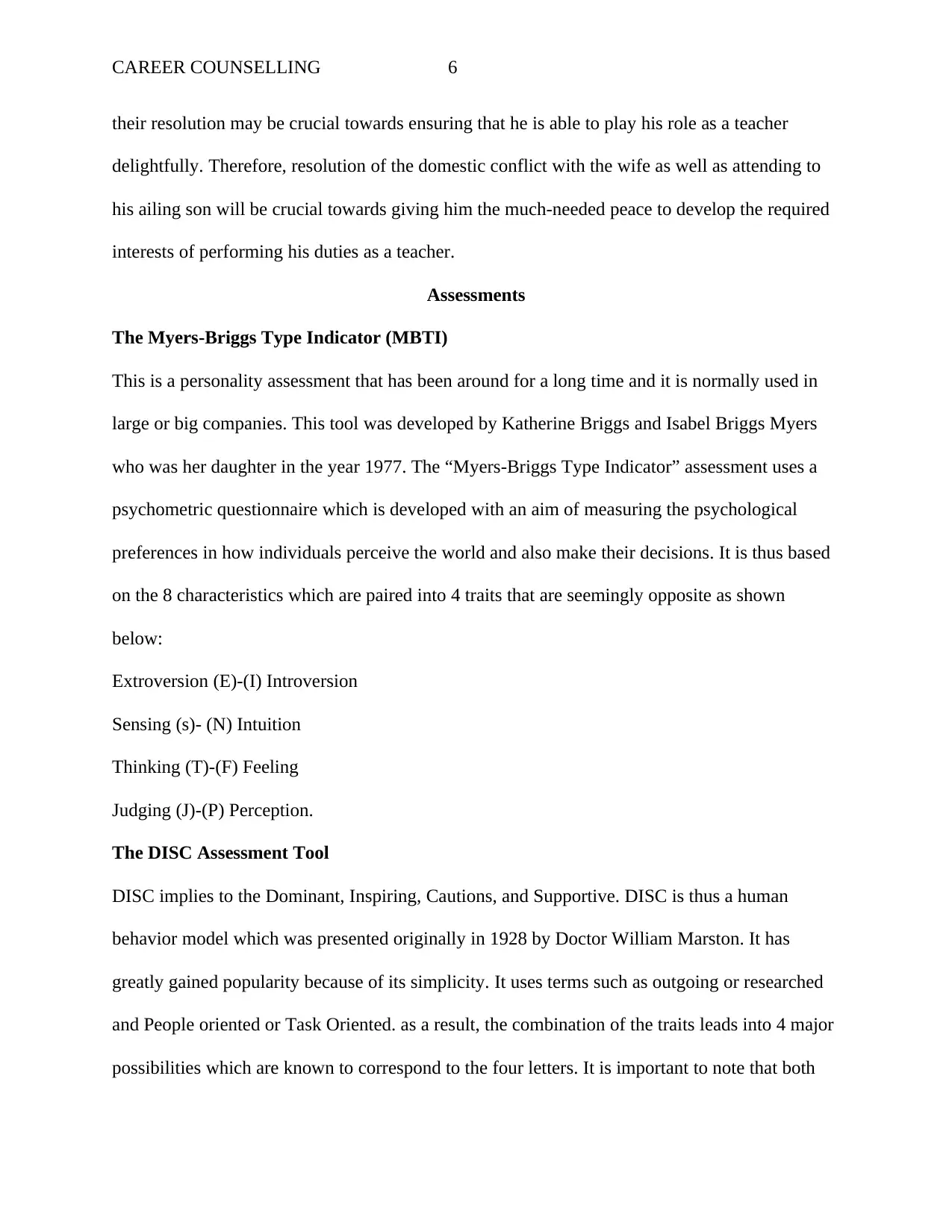
CAREER COUNSELLING 6
their resolution may be crucial towards ensuring that he is able to play his role as a teacher
delightfully. Therefore, resolution of the domestic conflict with the wife as well as attending to
his ailing son will be crucial towards giving him the much-needed peace to develop the required
interests of performing his duties as a teacher.
Assessments
The Myers-Briggs Type Indicator (MBTI)
This is a personality assessment that has been around for a long time and it is normally used in
large or big companies. This tool was developed by Katherine Briggs and Isabel Briggs Myers
who was her daughter in the year 1977. The “Myers-Briggs Type Indicator” assessment uses a
psychometric questionnaire which is developed with an aim of measuring the psychological
preferences in how individuals perceive the world and also make their decisions. It is thus based
on the 8 characteristics which are paired into 4 traits that are seemingly opposite as shown
below:
Extroversion (E)-(I) Introversion
Sensing (s)- (N) Intuition
Thinking (T)-(F) Feeling
Judging (J)-(P) Perception.
The DISC Assessment Tool
DISC implies to the Dominant, Inspiring, Cautions, and Supportive. DISC is thus a human
behavior model which was presented originally in 1928 by Doctor William Marston. It has
greatly gained popularity because of its simplicity. It uses terms such as outgoing or researched
and People oriented or Task Oriented. as a result, the combination of the traits leads into 4 major
possibilities which are known to correspond to the four letters. It is important to note that both
their resolution may be crucial towards ensuring that he is able to play his role as a teacher
delightfully. Therefore, resolution of the domestic conflict with the wife as well as attending to
his ailing son will be crucial towards giving him the much-needed peace to develop the required
interests of performing his duties as a teacher.
Assessments
The Myers-Briggs Type Indicator (MBTI)
This is a personality assessment that has been around for a long time and it is normally used in
large or big companies. This tool was developed by Katherine Briggs and Isabel Briggs Myers
who was her daughter in the year 1977. The “Myers-Briggs Type Indicator” assessment uses a
psychometric questionnaire which is developed with an aim of measuring the psychological
preferences in how individuals perceive the world and also make their decisions. It is thus based
on the 8 characteristics which are paired into 4 traits that are seemingly opposite as shown
below:
Extroversion (E)-(I) Introversion
Sensing (s)- (N) Intuition
Thinking (T)-(F) Feeling
Judging (J)-(P) Perception.
The DISC Assessment Tool
DISC implies to the Dominant, Inspiring, Cautions, and Supportive. DISC is thus a human
behavior model which was presented originally in 1928 by Doctor William Marston. It has
greatly gained popularity because of its simplicity. It uses terms such as outgoing or researched
and People oriented or Task Oriented. as a result, the combination of the traits leads into 4 major
possibilities which are known to correspond to the four letters. It is important to note that both
⊘ This is a preview!⊘
Do you want full access?
Subscribe today to unlock all pages.

Trusted by 1+ million students worldwide
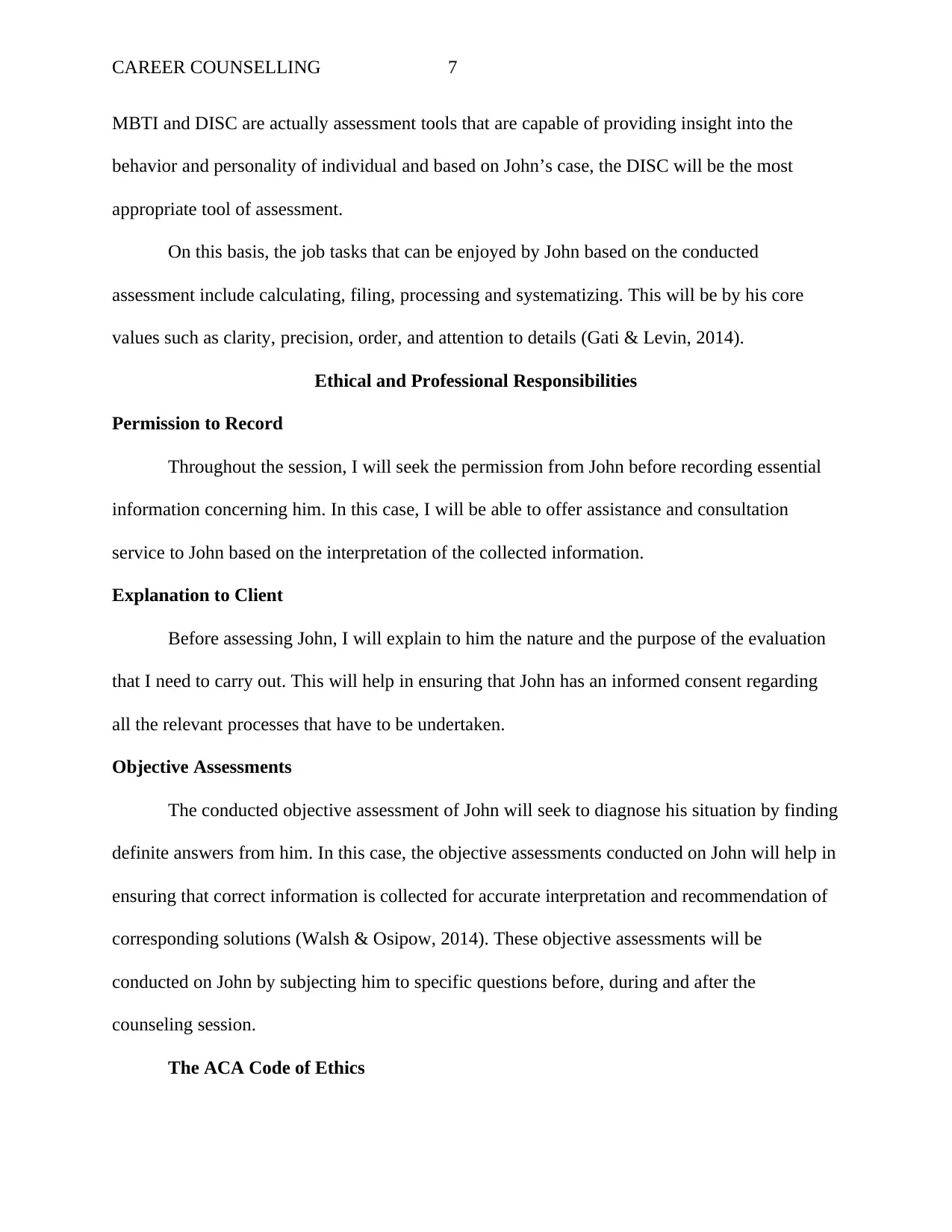
CAREER COUNSELLING 7
MBTI and DISC are actually assessment tools that are capable of providing insight into the
behavior and personality of individual and based on John’s case, the DISC will be the most
appropriate tool of assessment.
On this basis, the job tasks that can be enjoyed by John based on the conducted
assessment include calculating, filing, processing and systematizing. This will be by his core
values such as clarity, precision, order, and attention to details (Gati & Levin, 2014).
Ethical and Professional Responsibilities
Permission to Record
Throughout the session, I will seek the permission from John before recording essential
information concerning him. In this case, I will be able to offer assistance and consultation
service to John based on the interpretation of the collected information.
Explanation to Client
Before assessing John, I will explain to him the nature and the purpose of the evaluation
that I need to carry out. This will help in ensuring that John has an informed consent regarding
all the relevant processes that have to be undertaken.
Objective Assessments
The conducted objective assessment of John will seek to diagnose his situation by finding
definite answers from him. In this case, the objective assessments conducted on John will help in
ensuring that correct information is collected for accurate interpretation and recommendation of
corresponding solutions (Walsh & Osipow, 2014). These objective assessments will be
conducted on John by subjecting him to specific questions before, during and after the
counseling session.
The ACA Code of Ethics
MBTI and DISC are actually assessment tools that are capable of providing insight into the
behavior and personality of individual and based on John’s case, the DISC will be the most
appropriate tool of assessment.
On this basis, the job tasks that can be enjoyed by John based on the conducted
assessment include calculating, filing, processing and systematizing. This will be by his core
values such as clarity, precision, order, and attention to details (Gati & Levin, 2014).
Ethical and Professional Responsibilities
Permission to Record
Throughout the session, I will seek the permission from John before recording essential
information concerning him. In this case, I will be able to offer assistance and consultation
service to John based on the interpretation of the collected information.
Explanation to Client
Before assessing John, I will explain to him the nature and the purpose of the evaluation
that I need to carry out. This will help in ensuring that John has an informed consent regarding
all the relevant processes that have to be undertaken.
Objective Assessments
The conducted objective assessment of John will seek to diagnose his situation by finding
definite answers from him. In this case, the objective assessments conducted on John will help in
ensuring that correct information is collected for accurate interpretation and recommendation of
corresponding solutions (Walsh & Osipow, 2014). These objective assessments will be
conducted on John by subjecting him to specific questions before, during and after the
counseling session.
The ACA Code of Ethics
Paraphrase This Document
Need a fresh take? Get an instant paraphrase of this document with our AI Paraphraser
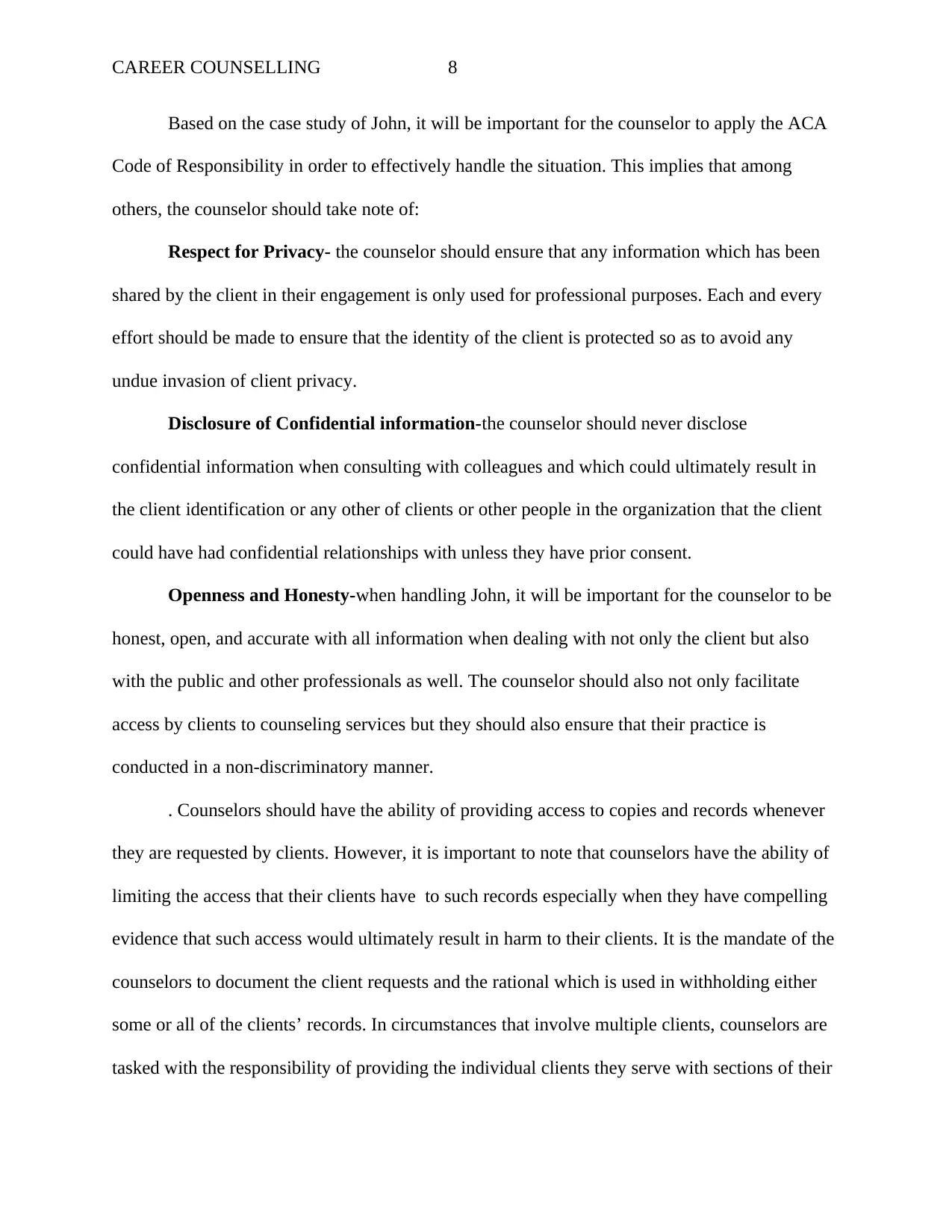
CAREER COUNSELLING 8
Based on the case study of John, it will be important for the counselor to apply the ACA
Code of Responsibility in order to effectively handle the situation. This implies that among
others, the counselor should take note of:
Respect for Privacy- the counselor should ensure that any information which has been
shared by the client in their engagement is only used for professional purposes. Each and every
effort should be made to ensure that the identity of the client is protected so as to avoid any
undue invasion of client privacy.
Disclosure of Confidential information-the counselor should never disclose
confidential information when consulting with colleagues and which could ultimately result in
the client identification or any other of clients or other people in the organization that the client
could have had confidential relationships with unless they have prior consent.
Openness and Honesty-when handling John, it will be important for the counselor to be
honest, open, and accurate with all information when dealing with not only the client but also
with the public and other professionals as well. The counselor should also not only facilitate
access by clients to counseling services but they should also ensure that their practice is
conducted in a non-discriminatory manner.
. Counselors should have the ability of providing access to copies and records whenever
they are requested by clients. However, it is important to note that counselors have the ability of
limiting the access that their clients have to such records especially when they have compelling
evidence that such access would ultimately result in harm to their clients. It is the mandate of the
counselors to document the client requests and the rational which is used in withholding either
some or all of the clients’ records. In circumstances that involve multiple clients, counselors are
tasked with the responsibility of providing the individual clients they serve with sections of their
Based on the case study of John, it will be important for the counselor to apply the ACA
Code of Responsibility in order to effectively handle the situation. This implies that among
others, the counselor should take note of:
Respect for Privacy- the counselor should ensure that any information which has been
shared by the client in their engagement is only used for professional purposes. Each and every
effort should be made to ensure that the identity of the client is protected so as to avoid any
undue invasion of client privacy.
Disclosure of Confidential information-the counselor should never disclose
confidential information when consulting with colleagues and which could ultimately result in
the client identification or any other of clients or other people in the organization that the client
could have had confidential relationships with unless they have prior consent.
Openness and Honesty-when handling John, it will be important for the counselor to be
honest, open, and accurate with all information when dealing with not only the client but also
with the public and other professionals as well. The counselor should also not only facilitate
access by clients to counseling services but they should also ensure that their practice is
conducted in a non-discriminatory manner.
. Counselors should have the ability of providing access to copies and records whenever
they are requested by clients. However, it is important to note that counselors have the ability of
limiting the access that their clients have to such records especially when they have compelling
evidence that such access would ultimately result in harm to their clients. It is the mandate of the
counselors to document the client requests and the rational which is used in withholding either
some or all of the clients’ records. In circumstances that involve multiple clients, counselors are
tasked with the responsibility of providing the individual clients they serve with sections of their
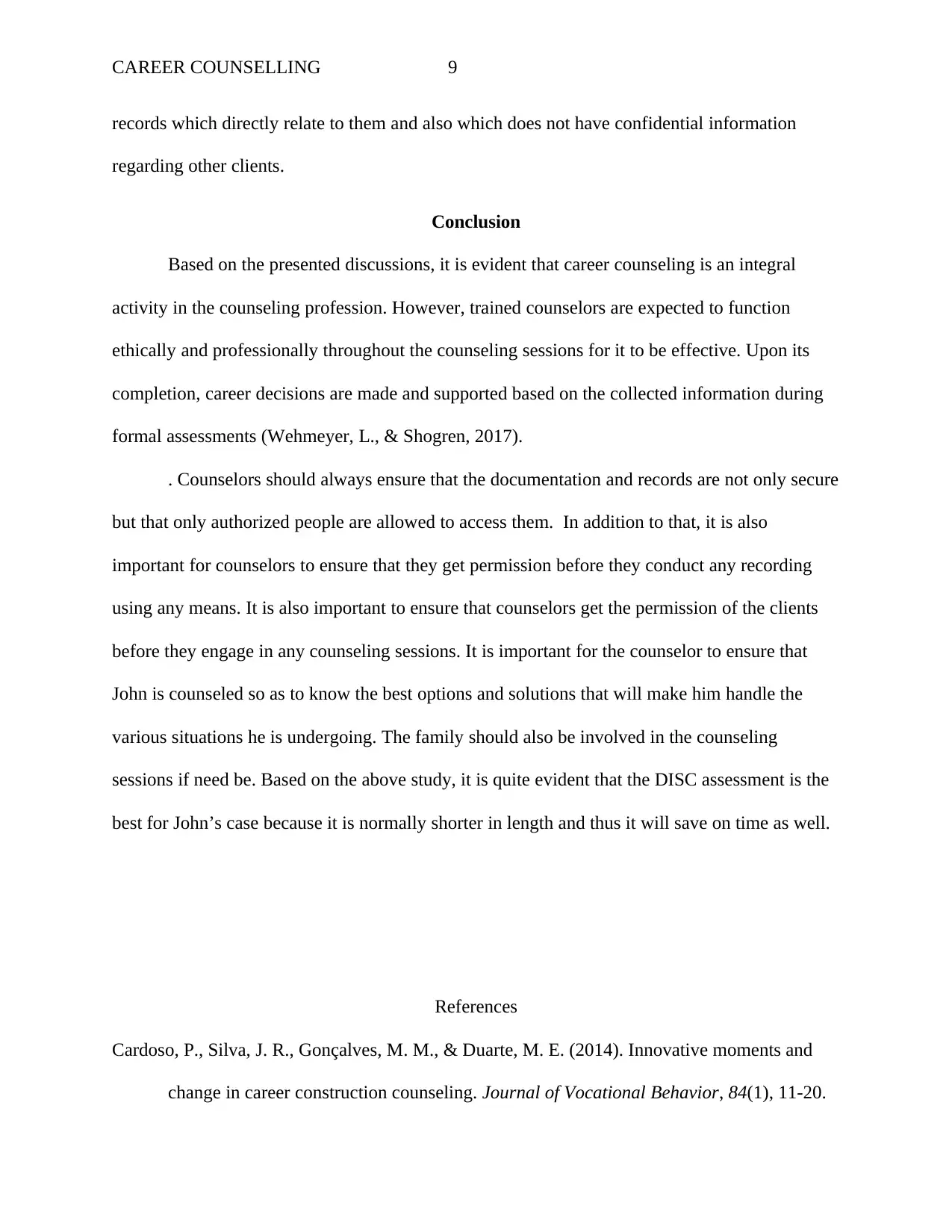
CAREER COUNSELLING 9
records which directly relate to them and also which does not have confidential information
regarding other clients.
Conclusion
Based on the presented discussions, it is evident that career counseling is an integral
activity in the counseling profession. However, trained counselors are expected to function
ethically and professionally throughout the counseling sessions for it to be effective. Upon its
completion, career decisions are made and supported based on the collected information during
formal assessments (Wehmeyer, L., & Shogren, 2017).
. Counselors should always ensure that the documentation and records are not only secure
but that only authorized people are allowed to access them. In addition to that, it is also
important for counselors to ensure that they get permission before they conduct any recording
using any means. It is also important to ensure that counselors get the permission of the clients
before they engage in any counseling sessions. It is important for the counselor to ensure that
John is counseled so as to know the best options and solutions that will make him handle the
various situations he is undergoing. The family should also be involved in the counseling
sessions if need be. Based on the above study, it is quite evident that the DISC assessment is the
best for John’s case because it is normally shorter in length and thus it will save on time as well.
References
Cardoso, P., Silva, J. R., Gonçalves, M. M., & Duarte, M. E. (2014). Innovative moments and
change in career construction counseling. Journal of Vocational Behavior, 84(1), 11-20.
records which directly relate to them and also which does not have confidential information
regarding other clients.
Conclusion
Based on the presented discussions, it is evident that career counseling is an integral
activity in the counseling profession. However, trained counselors are expected to function
ethically and professionally throughout the counseling sessions for it to be effective. Upon its
completion, career decisions are made and supported based on the collected information during
formal assessments (Wehmeyer, L., & Shogren, 2017).
. Counselors should always ensure that the documentation and records are not only secure
but that only authorized people are allowed to access them. In addition to that, it is also
important for counselors to ensure that they get permission before they conduct any recording
using any means. It is also important to ensure that counselors get the permission of the clients
before they engage in any counseling sessions. It is important for the counselor to ensure that
John is counseled so as to know the best options and solutions that will make him handle the
various situations he is undergoing. The family should also be involved in the counseling
sessions if need be. Based on the above study, it is quite evident that the DISC assessment is the
best for John’s case because it is normally shorter in length and thus it will save on time as well.
References
Cardoso, P., Silva, J. R., Gonçalves, M. M., & Duarte, M. E. (2014). Innovative moments and
change in career construction counseling. Journal of Vocational Behavior, 84(1), 11-20.
⊘ This is a preview!⊘
Do you want full access?
Subscribe today to unlock all pages.

Trusted by 1+ million students worldwide
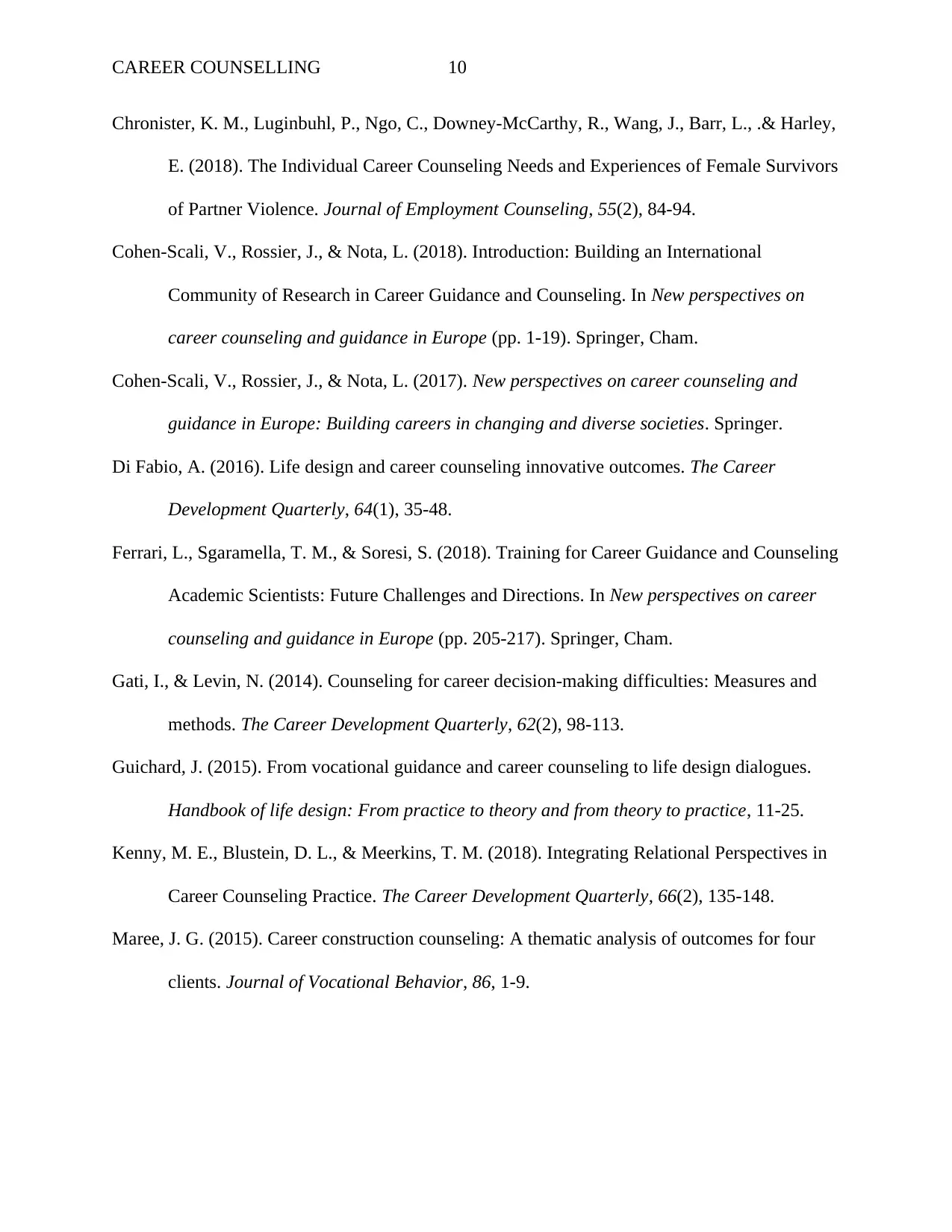
CAREER COUNSELLING 10
Chronister, K. M., Luginbuhl, P., Ngo, C., Downey‐McCarthy, R., Wang, J., Barr, L., .& Harley,
E. (2018). The Individual Career Counseling Needs and Experiences of Female Survivors
of Partner Violence. Journal of Employment Counseling, 55(2), 84-94.
Cohen-Scali, V., Rossier, J., & Nota, L. (2018). Introduction: Building an International
Community of Research in Career Guidance and Counseling. In New perspectives on
career counseling and guidance in Europe (pp. 1-19). Springer, Cham.
Cohen-Scali, V., Rossier, J., & Nota, L. (2017). New perspectives on career counseling and
guidance in Europe: Building careers in changing and diverse societies. Springer.
Di Fabio, A. (2016). Life design and career counseling innovative outcomes. The Career
Development Quarterly, 64(1), 35-48.
Ferrari, L., Sgaramella, T. M., & Soresi, S. (2018). Training for Career Guidance and Counseling
Academic Scientists: Future Challenges and Directions. In New perspectives on career
counseling and guidance in Europe (pp. 205-217). Springer, Cham.
Gati, I., & Levin, N. (2014). Counseling for career decision‐making difficulties: Measures and
methods. The Career Development Quarterly, 62(2), 98-113.
Guichard, J. (2015). From vocational guidance and career counseling to life design dialogues.
Handbook of life design: From practice to theory and from theory to practice, 11-25.
Kenny, M. E., Blustein, D. L., & Meerkins, T. M. (2018). Integrating Relational Perspectives in
Career Counseling Practice. The Career Development Quarterly, 66(2), 135-148.
Maree, J. G. (2015). Career construction counseling: A thematic analysis of outcomes for four
clients. Journal of Vocational Behavior, 86, 1-9.
Chronister, K. M., Luginbuhl, P., Ngo, C., Downey‐McCarthy, R., Wang, J., Barr, L., .& Harley,
E. (2018). The Individual Career Counseling Needs and Experiences of Female Survivors
of Partner Violence. Journal of Employment Counseling, 55(2), 84-94.
Cohen-Scali, V., Rossier, J., & Nota, L. (2018). Introduction: Building an International
Community of Research in Career Guidance and Counseling. In New perspectives on
career counseling and guidance in Europe (pp. 1-19). Springer, Cham.
Cohen-Scali, V., Rossier, J., & Nota, L. (2017). New perspectives on career counseling and
guidance in Europe: Building careers in changing and diverse societies. Springer.
Di Fabio, A. (2016). Life design and career counseling innovative outcomes. The Career
Development Quarterly, 64(1), 35-48.
Ferrari, L., Sgaramella, T. M., & Soresi, S. (2018). Training for Career Guidance and Counseling
Academic Scientists: Future Challenges and Directions. In New perspectives on career
counseling and guidance in Europe (pp. 205-217). Springer, Cham.
Gati, I., & Levin, N. (2014). Counseling for career decision‐making difficulties: Measures and
methods. The Career Development Quarterly, 62(2), 98-113.
Guichard, J. (2015). From vocational guidance and career counseling to life design dialogues.
Handbook of life design: From practice to theory and from theory to practice, 11-25.
Kenny, M. E., Blustein, D. L., & Meerkins, T. M. (2018). Integrating Relational Perspectives in
Career Counseling Practice. The Career Development Quarterly, 66(2), 135-148.
Maree, J. G. (2015). Career construction counseling: A thematic analysis of outcomes for four
clients. Journal of Vocational Behavior, 86, 1-9.
Paraphrase This Document
Need a fresh take? Get an instant paraphrase of this document with our AI Paraphraser
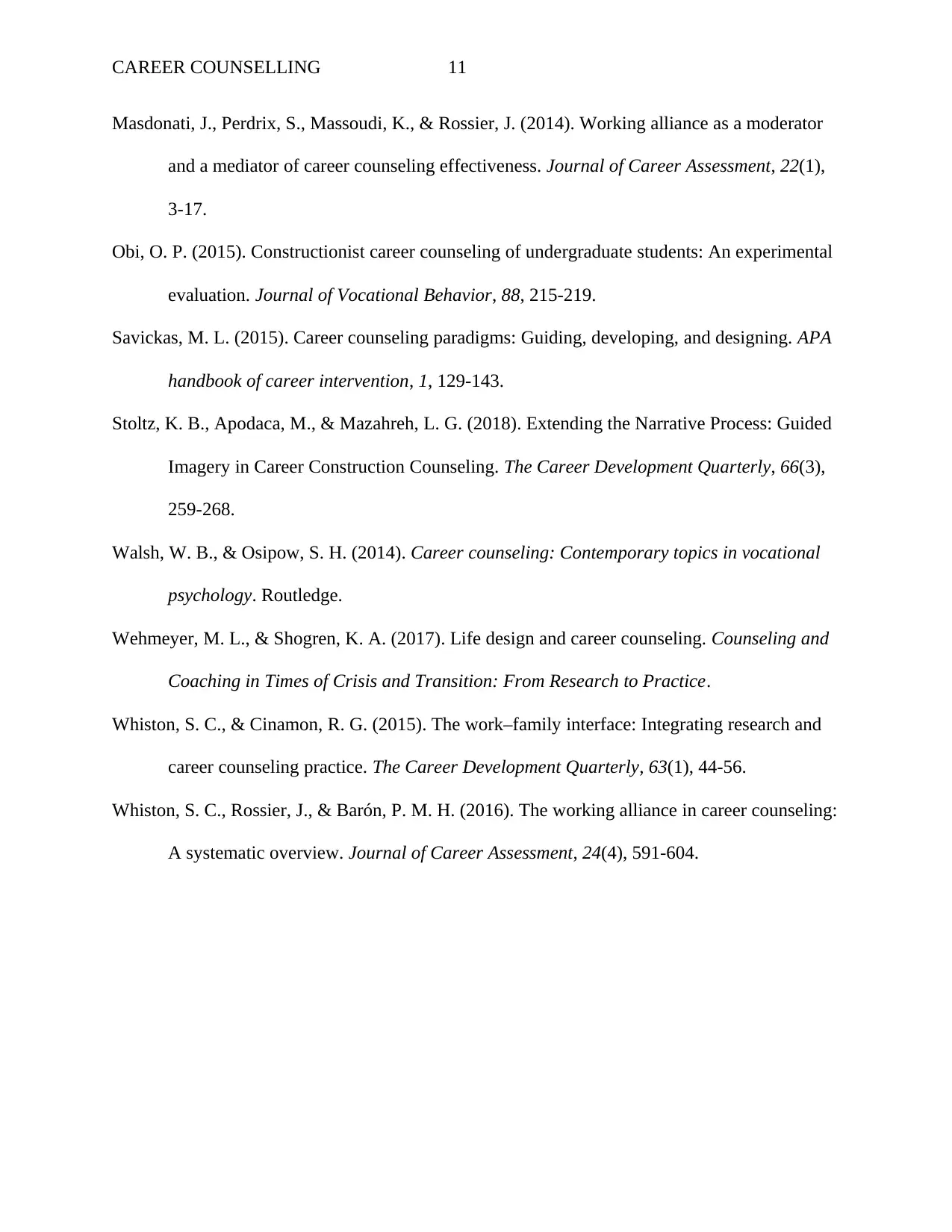
CAREER COUNSELLING 11
Masdonati, J., Perdrix, S., Massoudi, K., & Rossier, J. (2014). Working alliance as a moderator
and a mediator of career counseling effectiveness. Journal of Career Assessment, 22(1),
3-17.
Obi, O. P. (2015). Constructionist career counseling of undergraduate students: An experimental
evaluation. Journal of Vocational Behavior, 88, 215-219.
Savickas, M. L. (2015). Career counseling paradigms: Guiding, developing, and designing. APA
handbook of career intervention, 1, 129-143.
Stoltz, K. B., Apodaca, M., & Mazahreh, L. G. (2018). Extending the Narrative Process: Guided
Imagery in Career Construction Counseling. The Career Development Quarterly, 66(3),
259-268.
Walsh, W. B., & Osipow, S. H. (2014). Career counseling: Contemporary topics in vocational
psychology. Routledge.
Wehmeyer, M. L., & Shogren, K. A. (2017). Life design and career counseling. Counseling and
Coaching in Times of Crisis and Transition: From Research to Practice.
Whiston, S. C., & Cinamon, R. G. (2015). The work–family interface: Integrating research and
career counseling practice. The Career Development Quarterly, 63(1), 44-56.
Whiston, S. C., Rossier, J., & Barón, P. M. H. (2016). The working alliance in career counseling:
A systematic overview. Journal of Career Assessment, 24(4), 591-604.
Masdonati, J., Perdrix, S., Massoudi, K., & Rossier, J. (2014). Working alliance as a moderator
and a mediator of career counseling effectiveness. Journal of Career Assessment, 22(1),
3-17.
Obi, O. P. (2015). Constructionist career counseling of undergraduate students: An experimental
evaluation. Journal of Vocational Behavior, 88, 215-219.
Savickas, M. L. (2015). Career counseling paradigms: Guiding, developing, and designing. APA
handbook of career intervention, 1, 129-143.
Stoltz, K. B., Apodaca, M., & Mazahreh, L. G. (2018). Extending the Narrative Process: Guided
Imagery in Career Construction Counseling. The Career Development Quarterly, 66(3),
259-268.
Walsh, W. B., & Osipow, S. H. (2014). Career counseling: Contemporary topics in vocational
psychology. Routledge.
Wehmeyer, M. L., & Shogren, K. A. (2017). Life design and career counseling. Counseling and
Coaching in Times of Crisis and Transition: From Research to Practice.
Whiston, S. C., & Cinamon, R. G. (2015). The work–family interface: Integrating research and
career counseling practice. The Career Development Quarterly, 63(1), 44-56.
Whiston, S. C., Rossier, J., & Barón, P. M. H. (2016). The working alliance in career counseling:
A systematic overview. Journal of Career Assessment, 24(4), 591-604.
1 out of 11
Related Documents
Your All-in-One AI-Powered Toolkit for Academic Success.
+13062052269
info@desklib.com
Available 24*7 on WhatsApp / Email
![[object Object]](/_next/static/media/star-bottom.7253800d.svg)
Unlock your academic potential
Copyright © 2020–2025 A2Z Services. All Rights Reserved. Developed and managed by ZUCOL.





